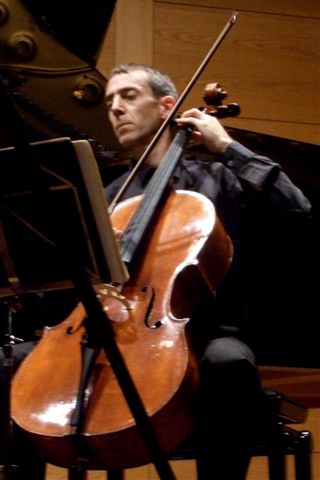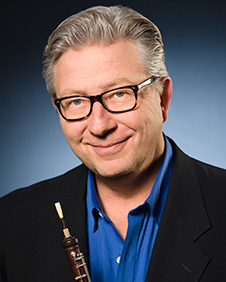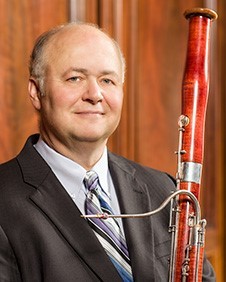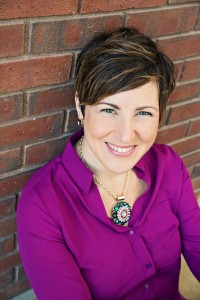Share This
Album at a Glance
Tags
Related Posts
- ‘Similar Motion” - Works for String Quartet by Philip Glass, Arthur Kampela, and Claude Debussy / Momenta Quartet
- Roman Statkowski (1859-1925): Piano Music / Barbara Karaskiewicz
- Walter Braunfels: Orchestral Works, Vol. 2 / BBC Concert Orchestra; Johannes Wildner
- Steve Wilson & Wilsonian’s Grain: Live in New York - The Vanguard Sessions
Music from America & Abroad for Oboe, Bassoon & Piano / John Dee, oboe; Timothy McGovern, bassoon; Cara Chowning, piano
Posted by Elaine Fine on Jun 18, 2015 in Contemporary | 0 comments
This recording of 20th-century music from Italy, the British Isles, Canada, and Germany uses oboe, bassoon, and piano in various combinations. Everything is tonal, lyrical, imaginative, and truly beautiful.
After spending many years holding principal positions in orchestras in the United States and Canada, oboist John Dee and bassoonist Timothy McGovern now combine careers as solo musicians with positions on the faculty of the University of Illinois in Champaign-Urbana. During the past decade audiences in Illinois have had the treat of hearing them play together often, and now, by way of this recording, their superb artistry as a double-reed "team" can be appreciated by people everywhere. Their work with pianist Cara Chowning, a Chicago-based former colleague from the University of Illinois, makes for exceptional chamber music.
The recording opens with the very bright and cheery Toccatino Precipitando (1999) written by the British composer Graham Waterhouse for oboe, bassoon, and piano. It is followed by Scotsman Alan Richardson's "French Suite for Oboe and Piano" (1946), a collection of neoclassical picturesque and playful character pieces that Dee and Chowning play with humor, serious expression, and true beauty.
This seems to be the first recording of this work, a piece given to John Dee by John De Lancie, the former principal oboist of the Philadelphia Orchestra. De Lancie must have know that these pieces would fit Dee's musical personality exactly. I particularly love the simple and direct Causerie, which Dee phrases exactly as one would speak about congenial matters to a good friend. This is also the first recording of the sultry Last Dance for Bassoon and Piano that Nikola Resanovic, a British composer of Serbian heritage, wrote in memory of his teacher Lynette Diers Cohen. McGovern gave the first performance of it in 2004.
Bill Douglas, who was born in Canada in 1944, writes very tonal, clean, and evocative music. Dee gives these simple and picturesque pieces written between 1971 and 1995 (with titles like “The Hills of Glencar,” and “Sweet Rain”) eloquent and poetic readings. Hagood Hardy's music for Anne of Green Gables comes instantly to mind. The simple Douglas pieces contrast beautifully with the more complex music of the German composer Michael Stöckigt. His Sonatine for Bassoon and Piano (1976) is a short-yet-substantial work demanding real virtuosity and rhythmic buoyancy from McGovern, which he supplies in spades, hearts, clubs, and diamonds.
The Concerto in F, written in 1953 in a 19th-century style by Umberto Bertoni, is a standard virtuoso concert piece for bassoon and piano. I don't find the music as interesting as the other works here, but the playing is spectacular.
On either side of the Bertoni are two wonderful works by the British composer Michael Head. The "Elegiac Dance," the first of Head's Two Pieces for Oboe and Piano (1954) reminds me a bit of the Schumann Romances, but with rich mid-20th-century harmonies; and the chipper Presto that follows has textures and harmonies that remind me of Darius Milhaud. Head's Trio for Oboe, Bassoon, and Piano (1977) is full of bright British musical banter, and musical atmosphere. It would be a perfect concert companion to the often-played Poulenc, which has been happily omitted from this program to make room for these more obscure, but equally delightful, works.
Two colleagues from the University of Illinois, Urbana-Champaign, oboist John Dee and bassoonist Timothy McGovern, join pianist Cara Chowning in a program of music for winds and piano.
The composers hail from the U.K., Germany, Italy, Canada and the U.S. The program includes two trios for oboe, bassoon and piano; two works for oboe and piano and two works for bassoon and piano.
All three performers have enjoyed active performing and academic careers. Dee served as principal oboe of the Florida Philharmonic and Florida Opera and McGovern is principal bassoon of the Illinois Symphony Orchestra as well as the bassoonist for the Prairie Winds Woodwind Quintet. In addition to her performance schedule, Chowning was music director of Opera Cleveland's Great Works Outreach Department.
Source: Albany Records
 Graham Waterhouse |
Graham Waterhouse, composer Graham Waterhouse (born 2 November 1962) is an English composer and a cellist. He is known for chamber music and for unusual scoring, such as Bright Angel for three bassoons and contrabassoon,Chieftain’s Salute for Great Highland Bagpipe and string orchestra, and works for speaking voice and cello, such as Der Handschuh. For his own instrument, he has composed a cello concerto and Three Pieces for Solo Cello. He wrote string quartets and compositions which juxtapose it with a solo instrument, including Piccolo Quintet, Bassoon Quintet and Rhapsodie Macabre. Source: Wikipedia _______________________________________ |
|
Alan Richardson |
Alan Richardson, composer Alan Richardson (29 February 1904 – 29 November 1978) was a Scottish pianist and composer. Richardson was born in Edinburgh, where he worked for some time as a pianist for the BBC before going to London to study piano and composition, from 1929 to 1930, with Harold Craxton at the Royal Academy of Music. In 1931 he undertook a concert tour of Australia and New Zealand. He was accompanist for violinist Carl Flesch from 1936 to 1939. Richardson married renowned oboist Janet Craxton, the daughter of his teacher Harold Craxton, in 1961.[1] He was appointed Professor of Piano at the Royal Academy of Music in 1960, a position he held until his death in 1978. Richardson composed many pieces for piano, as well as some chamber music, including several works for the oboe which he wrote for his wife. He died, aged 74, in London. Source: Wikipedia _______________________________________
|
|
Michael Head |
Michael Head, composer Michael Head (28 January 1900 – 24 August 1976) was a British composer, pianist, organist and singer who left some enduring works still popular today. He was noted for his association with the Royal Academy of Music. His compositional oeuvre mainly consists of songs, as well as choral works and few larger-scale pieces such as a piano concerto. Most of Head’s works are songs. However, his early works include a piano concerto, a tone poem, and scherzo for orchestra. His best known song cycles are Over the Rim of the Moon (1918–19) and Songs of the Countryside (1921-23). The first of these contains probably his most famous song, “The Ships of Arcady”. All the texts in this song cycle, including “The Ships of Arcady”, were by the Irish war poet, Francis Edward Ledwidge, who was killed in action during World War I on 31 July 1917. Songs of the Countryside uses poems by various poets. The first song, “Sweet Chance, That Led My Steps Abroad” was by W. H. Davies. “The Piper” is a setting of Seamus O’Sullivan’s famous poem of the same name. One of his popular songs is the Christmas Carol,The Little Road to Bethlehem (“As I walked down the road at set of sun”), the words of which are by Margaret Rose. Other famous songs include “Money, O!” and “Why have you stolen my delight?” (see Bush, 1982). Head used two types of scale in his compositions; diatonic and chromatic. Using the former, he produced simple, melodic tunes, easily remembered and easily sung. As they are pleasant and easily understood, people who have heard them often find themselves humming or whistling them to themselves (see Bush, 1982). They are thus the type for which he is best remembered. “The Ships of Arcady” is an example of these. The chromatic style is best represented by Nocturne, A Piper. In all of his songs Michael Head exhibits two areas of equal importance; musical content, and the effectiveness of the word setting to create a complete whole. Source: Wikipedia _______________________________________
|
|
Nikola Resanovic |
Nikola Resanovic, composer Nikola Resanovic (born 1955) is an American composer and professor of music. He is the winner of the 2003 Cleveland Arts Prize in Music and is one of Ohio’s best known living composers. In 1955, he was born in Derby, England. Resanovic moved to the United States where he has been a naturalized citizen since 1976. He holds degrees from the University of Akron and the Cleveland Institute of Music. He is currently a Professor of Music at theUniversity of Akron. Resanovic has composed numerous symphonic and choral works, symphonic band works, chamber and solo works, as well as some rather avant-garde electro-acoustic compositions. His works have been performed globally. His choral works are heavily influenced by Serbian music; Resanovic, of Serbian descent himself, has extensively studied the sacred chants of the Serbian Orthodox Church and has composed several volumes of liturgical music. Source: Wikipedia _______________________________________
|
|
Bill Douglas |
Bill Douglas, composer Bill Douglas (born November 7, 1944) is a Canadian musician, composer, pianist, and bassoonist whose works bear influences from classical music, jazz, African, Brazilian and Indian music, 1970s funk and many other genres. He has toured and recorded for thirty years with clarinetist Richard Stoltzman. As a bassoonist, he has played with the Toronto and New Haven Symphony Orchestras and has recorded three RCA albums with Peter Serkin and Tashi (Ida Kavafian, Fred Sherry, Richard Stoltzman and Peter Serkin). As a jazz pianist, he has toured and recorded with vibraphonist Gary Burton and bassist Eddie Gómez. In 1994, the Society of Composers, Authors and Music Publishers of Canada (SOCAN), the Canadian equivalent of the American Society of Composers, Authors and Publishers (ASCAP) and Broadcast Music Incorporated (BMI), presented him with their classical composer of the year award. His compositions have been performed by major orchestras and chamber groups around the world. He has been teaching at Naropa University in Boulder, Colorado for twenty-nine years. Thirteen CDs of his music are available. Source: Wikipedia _______________________________________
|
|
Michael Stöckigt |
Michael Stöckigt, composer Michael Stöckigt (born 1957) is a German composer and pianist. His father is the famous East German pianist Siegfried Stöckigt. In 1973 Michael Stöckigt became a master student in composition of Günter Kochan at the Berlin College of Music “Hanns Eisler”. He was awarded in Australia, Austria (International Composition Competition, 1981) and Italy. Today he is a docent in Berlin and at the University of Music and Theatre in Rostock. As a pianist he performed in France, Syria and the Netherlands. He composes for musicians such as the Ensemble Sortisatio. Source: Wikipedia _______________________________________
|
 John Dee |
John Dee, oboe John Dee is the Bill A. Nugent Endowed Professor of Music Performance and Professor of Oboe at the University of Illinois. He was principal oboe of the Florida Philharmonic Orchestra and Florida Grand Opera for over twenty years and also Oboe Professor at the University of Miami and the Harid Conservatory of Music. Prior to this, he was principal oboe of the Florida Orchestra in Tampa, and the Civic Orchestra of Chicago. His teachers include: June Wollwage and Gladys Elliot of the Lyric Opera Orchestra, Daniel Stolper at Interlochen, Robert Mayer, Michael Henoch and Ray Still of the Chicago Symphony Orchestra and Northwestern University, and John Mack of the Cleveland Orchestra and Cleveland Institute of Music. Teaching Philosophy: “I realize that all students have different personalities and strengths that become their unique signature of sound and musicality. It is my privilege to help them perfect or improve their unique talents and potential. I do not teach students to play like me or imitate my particular sound. I believe in high educational standards in technique, musicality and reed making skills that are essential in preparing students to be competitive in auditioning for major positions. I want my students to become skilled artists who are confident, with their ability to express themselves freely.” -John Dee Source: University of Illinois School of Music _______________________________________
|
 Timothy McGovern |
Timothy McGovern, bassoon In addition to his appointment as Associate Professor of Bassoon at the University of Illinois at Urbana-Champaign, Timothy McGovern is currently Principal Bassoonist with the Illinois Symphony Orchestra and a member of the Prairie Winds Woodwind Quintet and IQ (Illinois Woodwind Quartet). For seven years he was Associate Principal Bassoon of the Montrèal Symphony Orchestra and Principal Bassoon of the Montrèal Symphonette and McGill Chamber Orchestra. During the spring term of 2008, Professor McGovern was a Visiting Associate Professor of Bassoon at Indiana University. He has also performed with the Chicago, Boston, Toronto, Delaware, Grant Park, and Ravinia Festival Orchestras, among others. Professor McGovern has performed with many legendary musicians such as Itzhak Perlman, Cecilia Bartoli, Isaac Stern, Joshua Bell, Yo-Yo Ma, Mstislav Rostropovich, Kiri Te Kanawa, Leonard Bernstein, Sir Neville Marriner, Charles Dutoit, and Seiji Ozawa, among others. He has recorded approximately 30 CD’s of diverse orchestral and chamber music repertoire with London/Decca and other recording companies. Source: University of Illinois School of Music _______________________________________
|
 Cara Chowning |
Cara Chowning, piano Equally at home in vocal and instrumental repertoire, pianist Cara Chowning is in demand as a coach and collaborative artist. She has performed extensively throughout the United States and Europe, with such ensembles as the Chicago Chamber Musicians, Kunst in der Stadt, Graz, Storioni Ensemble, and Festpelen Pitea. Ms. Chowning is a frequent guest on recital series throughout the Midwest and Northeast Ohio and has been broadcast on WFMT, WCLV and Iowa Public Radio. She holds degrees in piano performance and collaborative piano from Northwestern University and the Cleveland Institute of Music. In 2003 she joined the Cleveland Institute of Music’s accompanying faculty and has also served on the faculties of Simpson College, Cleveland State University and the Cleveland Music School Settlement. Currently, she is Music Director for the vocal series of the Bar Harbor Music Festival and the Principal Coach/Assistant Conductor of the Opera Division at the University of Illinois. |
![]() About Elaine Fine
About Elaine Fine
Twitter •
| Thinking about purchasing this album?
Follow this link for more album details or to make the purchase. Buy it now |
“Not just recommended. Guaranteed.”
We stand behind every album featured on Expedition Audio. Our objective is to take the monetary risk out of music exploration. If you order this album from HBDirect.com and do not like it you can return it for a refund.
GRAHAM WATERHOUSE: Toccatina Precipitando, Op. 24 (1999)





